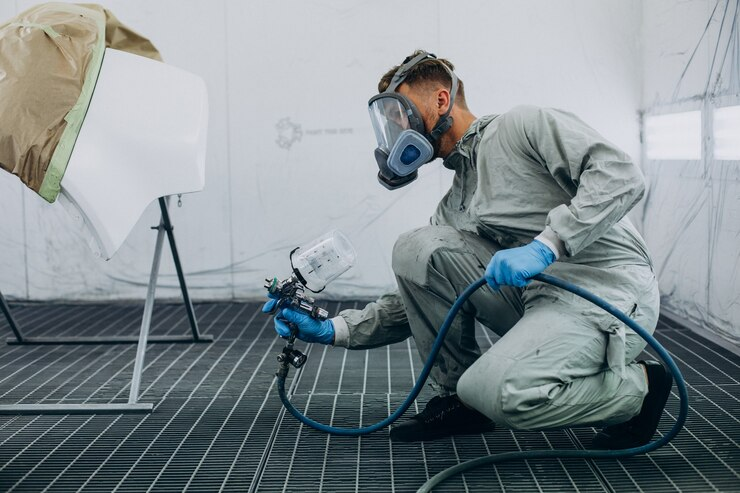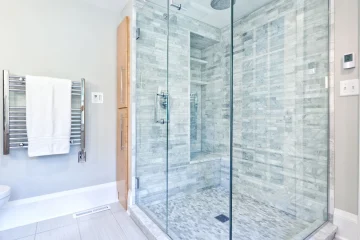When planning a painting project, it’s crucial to grasp the differences between commercial and industrial painting. These services cater to distinct environments and serve different purposes. Sunland Decorations offers commercial and industrial painting services, tailored to meet the unique needs of each setting.
Commercial Painting
1. Purpose and Projects
Commercial painting enhances the appearance and atmosphere of business spaces, focusing on aesthetics and customer experience. Typical projects include offices, retail stores, restaurants, cafés, and hotels.
- Offices: Creating a professional and welcoming environment for employees and clients.
- Retail Stores: Designing visually appealing spaces that effectively attract customers and showcase products.
- Restaurants and Cafés: Establishing a cozy and inviting atmosphere complements the dining experience.
- Hotels: Ensuring consistency in brand aesthetics across guest rooms, lobbies, and other common areas.
2. Elements
- Interior and Exterior Painting: Covering walls, ceilings, trim, and exterior facades to ensure alignment with the business’s brand.
- Decorative Finishes: Including faux finishes, murals, and accent walls to create unique and engaging spaces.
- Specialty Coatings: Using products that enhance the look and durability of surfaces, such as washable and stain-resistant paints.
Industrial Painting
1. Purpose and Projects
The industrial painting focuses on functionality, durability, and safety, essential for environments facing harsh conditions and heavy use. Typical projects include warehouses, manufacturing plants, storage facilities, refineries, and power plants.
- Warehouses: Protecting large spaces from wear and tear, including walls, ceilings, and floors.
- Manufacturing Plants: Coating machinery and equipment to prevent corrosion and ensure longevity.
- Storage Facilities: Applying protective industrial coatings to surfaces exposed to chemicals, temperature fluctuations, and heavy traffic.
- Refineries and Power Plants: Ensuring surfaces withstand extreme conditions, including high temperatures and chemical exposure.
2. Elements
- Epoxy Flooring: Providing durable, easy-to-clean surfaces that can withstand heavy machinery and high traffic.
- Protective Coatings: Use specialized coatings like epoxies, polyurethanes, and industrial enamels to protect surfaces from corrosion, chemicals, and physical damage.
- Surface Preparation: Techniques like sandblasting and power washing ensure surfaces are clean and ready for painting, enhancing the adhesion and longevity of the coatings.
Key Differences
1. Focus and Objectives
- Commercial Painting: Emphasizes aesthetics and customer experience. The goal is to create an inviting, professional environment that reflects the business’s brand and appeals to clients and employees.
- Industrial Painting: Prioritizes protection and durability. The focus is on safeguarding surfaces and equipment from harsh conditions, ensuring longevity and operational efficiency.
2. Materials and Techniques
- Commercial Painting: Utilizes high-quality paints and decorative finishes to achieve a visually appealing result. Techniques may include detailed brushwork, rolling, maintenance painting, and spraying for a smooth, polished look.
- Industrial Painting: Employs heavy-duty coatings and advanced preparation techniques to ensure maximum durability. This often involves using specialized equipment and materials designed to withstand industrial conditions.
3. Project Management
- Commercial Painting: Requires flexible scheduling to minimize disruption to business operations. Projects are often carried out during off-hours or in phases to ensure business continuity.
Industrial Painting: Involves careful planning to adhere to safety standards and regulatory requirements. Projects may require extensive preparation and coordination to ensure safety and efficiency.
Conclusion
Industrial painting is more than just aesthetics; it’s a critical component of maintaining and protecting industrial assets. Epoxy flooring is a highly durable, versatile solution for both residential and commercial spaces. For professional installation, commercial epoxy floor contractors AU offer specialized services to ensure optimal results for industrial and commercial spaces.
Remember, a well-maintained industrial facility is not only visually appealing but also a testament to a company’s commitment to safety, quality, and long-term sustainability.



